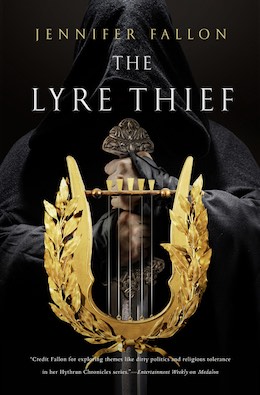The Lyre Thief is the opening volume in a new epic fantasy trilogy by Australian author Jennifer Fallon. It follows on from one of Fallon’s previous trilogies, forming a ten-years-after sequel of sorts to the events of her Demon Child trilogy (Medalon, Treason Keep, Harshini).
I know I read the previous trilogy—I’ve kept a log for years, and those books are in it—but it seems to have left as much an impression on my memory as frost leaves on a window when it melts. Some names are vaguely familiar, but that’s as far as it goes. Perhaps that, as much as my recent burnout on narrative in general, may explain why The Lyre Thief left me cold. Or perhaps, as far as epic fantasy goes, The Lyre Thief simply isn’t very good.
There are four main narrative threads in The Lyre Thief. The prologue—baffling in its attempt to be ominous—introduces us to one that slides into the background for much of the book. A young man with a grudge steals a golden lyre belonging to the god of music, and containing an important part of said god’s power. (What’s so important about the lyre? I wish I knew: The Lyre Thief isn’t really clear on that part.)
In another narrative strand, the Princess Rakaia, one of dozens of princesses in her father’s harem, is being married off to seal a treaty. Her mother has other plans, however, as Rakaia’s life is at risk if her father ever discovers her mother’s infidelity. She convinces Rakaia to convince her half-sister and slave, Charisee, to impersonate her on the journey to her marriage, while Rakaia flees disguised as a servant. In Rakaia’s flight, her path crosses that of R’shiel, a young immortal who is searching for a way to redeem her lover from Death. R’shiel’s actions set Rakaia into the path—though this doesn’t become clear until later—of that young man with a grudge, who is now travelling as a musician called Mica. When R’shiel leaves Rakaia to her own devices, Rakaia ends up travelling with Mica, who, she discovers, can control people with his music.
Meanwhile, Charisee is adjusting to living as a princess, and falling in love with the handsome young well-connected member of the assassin’s guild who’s in charge of her escort to her wedding at the court of Damin Wolfblade. And events that R’shiel has set in train cause upheaval in said court, as Damin falls into a coma from which no one can wake him. And during the celebrations of Charisee’s wedding, Mica takes steps to achieve his revenge.
It ends on a cliffhanger. This is not, it seems, the sort of trilogy in which the constituent books are complete stories in themselves.
If there’s one word I can think of to describe The Lyre Thief, it’s “crowded.” There are a hell of a lot of characters here, most of whom get very little development or page-time. It is as though the author expects us to know—or remember—who all of these people and places are. Me, I neither know nor remember, and I would have preferred a narrative that focused on rather fewer characters and gave me more reason to care about each. Some of the characters have so little time on the page that it’s hard to get past the overwhelming familiarity of cliché: wicked vizier, subtype eunuch slave; noble assassin with a heart of gold—this is a novel that has an assassins’ guild and a thieves’ guild operating within its pages—the princess who longs for adventure…
In many regards, this makes The Lyre Thief feel shallow, almost cursory: the lines are drawn for a set of stories we’ve seen before, the shape of a painfully well-trodden road. There’s nothing necessarily wrong with shallow—you can have as much fun in a paddling pool as you can in a lake, after all—or with familiar, but The Lyre Thief isn’t doing anything new or striking or strange, isn’t questioning the tropes it so calmly displays across its landscape, and its prose is decidedly pedestrian. It rubbed me entirely the wrong way. I’m not sure I can put a finger on why, exactly: any number of small things that add up to I don’t hate it but I don’t care, either.
And its pacing is just plain odd. Although I’m not sure whether my impression that nothing very much of note happens in The Lyre Thief can be ascribed to the fact that I didn’t care very much about any of the characters things were happening to, or because The Lyre Thief altered between leaping from incident to incident—many of which were probably intended to be emotionally fraught, but never quite attained that mark for me—and providing stretches of travelogue in which Charisee and Rakaia reflect on their changed circumstances and their respective concerns.
If there’s a theme that unites the disparate threads of The Lyre Thief, I can’t find it. I wanted to like this book—I always want to like the book in front of me—but the sad truth is, the best I can say of it is mediocre.
The Lyre Thief is available now from Tor Books.
Liz Bourke is a cranky person who reads books. She has recently completed a doctoral dissertation in Classics at Trinity College, Dublin. Find her at her blog. Or her Twitter.










